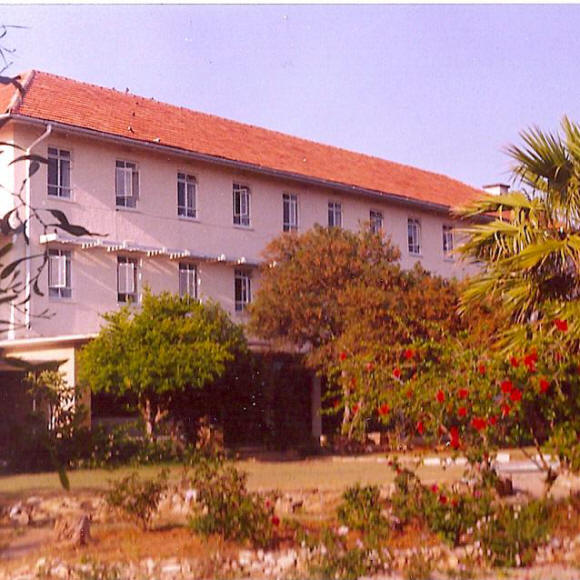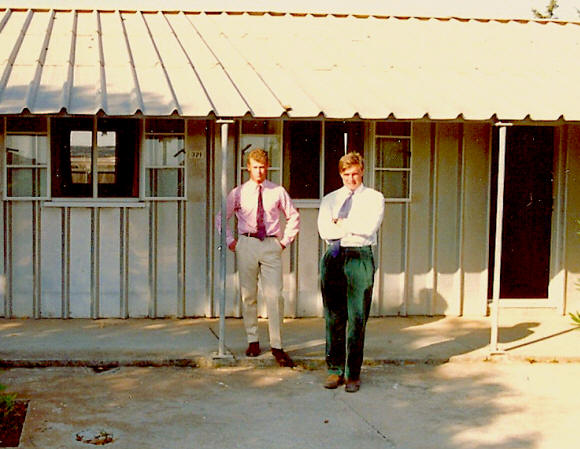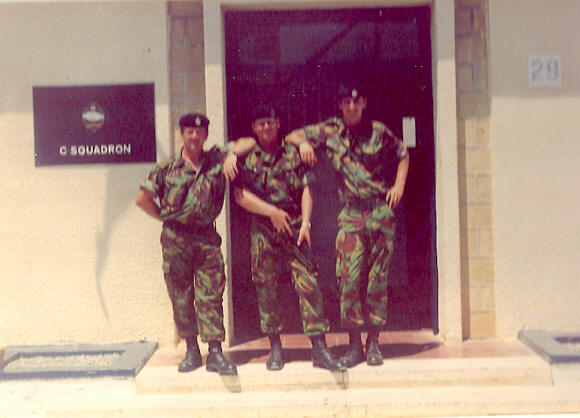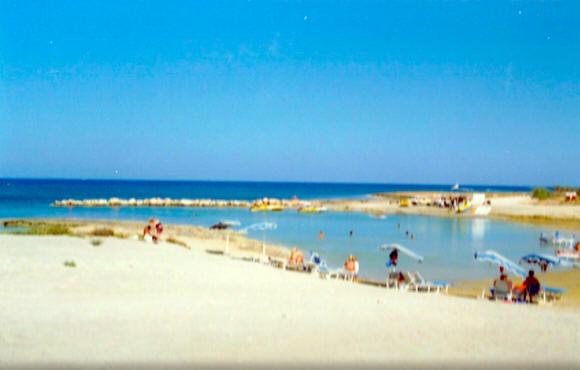|

WHEN I
REJOINED 4th Tonks in early 1989 it was still in
Osnabruck. I had visited the Regiment once, I think,
over the past four years and it was less familiar to me
although only some of the personalities had changed. The
Officers’ Mess, though, was quite different. A whole
generation of young subalterns had joined, and many had
already left having completed their Short Service
Commissions, during the time I had been away. I also
found that I was now the most senior bachelor officer
which was distinctly odd.
The good news was that the Regiment was now commanded by
Lt Col (later Brigadier) Charlie McBean, a fellow
Glaswegian, and his adjutant was another Scotsman,
Archie Lightfoot from South Uist, so we really did live
up to our claim of being “Scotland’s Own Royal Tank
Regiment”. I was given command of C Squadron, where my
2ic was Patrick Kidd, who went on to become a Brigadier
in the Australian Army, and the subalterns were Hamish
De Bretton Gordon (DBG, now the media’s go-to expert on
all aspects of chemical and biological warfare), Sean
Rickard, a Kiwi, Charlie Pratt (now Cavanagh) and Brett
Fleming-Jones. They were all nice boys and I liked them
a lot. I think Patrick probably thought I was a bit
casual and a soft touch discipline wise, and he may have
been right. After all, he’s the one that made Brigadier,
not me!

Charlie Pratt and Hamish De Bretton Gordon
It’s an
old adage that the senior NCOs were, and no doubt still
are, the backbone of the British army, and that was
definitely the case in C Squadron. Mine were an
outstanding bunch; I couldn’t have wished for a better
SSM than WO2 Stuart King, nor in my SQMS Davy Valley.
Troop Sgts came and went a little during my time in
command but included John Barnwell, Sinky Sinclair,
Jimmy Simpson (now McCalman), John Riach, Murdo McLeod
and “Jack” Russell. They were the ones who kept the
whole thing ticking over smoothly and they were a fine
bunch.

SQMS Davy Valley and crew
I arrived
back at the Regiment just in time to participate in our
UN tour of Cyprus as dismounted infantry. This was meant
to be a jolly, a holiday posting for all of us after
eight years of BAOR grind on panzers. Consequently, in
early 1989 we put our tanks into the hangars and started
re-learning the basic infantry skills we had all gone
through in basic training. Out went our Sterling
sub-machine guns (SMGs) and in came the Belgian designed
self-loading rifles (SLRs), bigger, longer, heavier and
infinitely more powerful. They allowed the old sweats to
swing the lamp about previous Norn Ireland tours where
they had last used them.
4th Tonks had always been reasonably fit; we held two
regimental runs a week on top of other voluntary sports
activities. But we commenced trying to get infantry fit
with a series of route marches carrying rifles and
webbing, and it was surprising how many of the younger
lads found this difficult. We got there in the end,
though. Then at some point we had to pass our Annual
Personal Weapon Test (APWT) on the SLR. The final bit of
preparation was the CO’s exercise to confirm our
infantry skills in a series of advances, attacks, and
patrols out in the field.
The “field”, in this case, was literally that, German
farmers’ fields in the monotonously boring northwest
German plain. Depressing at the best of times in late
winter/early spring, they were made much worse by the
near constant rain and the farmers’ habit of spreading
untreated pigs manure on them to encourage growth. As
the correct response to coming under effective enemy
fire is “down, crawl, observe, fire”, you can imagine
how popular that was in the circumstances. We stank to
high Heaven and were only too glad when it ended.
And then in June of that year we went to Cyprus. I can’t
actually remember how we got there but obviously we
flew. I do remember the CO getting mightily hacked off
with the RAF for making us wait around for come
considerable time before we set off, a recurring theme
during my military career. We hated RAF movements, who
we thought lax, scruffy, rude and inefficient – which
they were. Anyway, eventually we landed in RAF Akrotiri
and wended our way up to Dhekelia in the Sovereign Base
Area (SBA), where C Squadron was to spend the first
three months of our six month tour before moving up on
to the UN Green Line.
Soldiering in the SBA was like being back in the days of
the Empire. We were nominally guarding the base, but in
fact there was no enemy, and the boys got quickly bored
stagging on despite a few training exercises thrown in
to keep us occupied. The Base Commander was clearly
bonkers, perhaps having spent too long in the sun. It
was his habit to turn up at 3 am in the wee small hours
in full dress uniform to inspect the pillboxes our
sentries manned 24/7, probably to try and catch them
sleeping on the job. We despised him for it.

Marlita beach
It was
blooming hot too, and we worked from 6 am until 2 pm and
then packed it in for the day. Our barracks were on the
beach, and for the first fortnight the sea was full of
white, skinny Scottish soldiers frolicking about as if
on holiday in Torremolinos. After that initial burst of
enthusiasm few bothered any more. We spent time at the
nearby “Larnaca strip”, a collection of dingy and
dilapidated bars, restaurants and clubs which ran along
the coast road, and dined on a standard and repetitive
menu of “mezes” (a selection of small dishes served as
appetizers) until we could stand them no more. In the
Officers’ Mess (main picture) brandy sours were the
drink of the tour for reasons I know not – cheap brandy
I would presume. They were very refreshing anyway.
To be frank, southern – that is Greek – Cyprus was a
mess at that time, all dusty roads and half-finished
buildings with the beginnings of the modern tourist
trade which now defines it. The British expats were
awful people and we tried to have as little to do with
them as we could. The British holidaymakers even more
so. I did spend some time, though, visiting some of the
ancient ruins on the island which were quite impressive.
There was also a rolling programme for R&R which meant
that we were never completely up to strength at any one
time. Lots of the boys took the boat trip to Egypt,
which by all accounts was a bit of a booze cruise,
whereas the officers tended to go home or bring their
WAGs over to the island for a fortnight or longer.
At some point we went up the long, narrow extension to
the SBA which led up to the listening station at Ayios
Niklaos, just short of the deserted former holiday
resort of Famagusta which was in the middle of the
no-man’s land between Turkish and Greek Cypriots. What
allegedly goes on here can be found via Wikipedia but
suffice to say there seemed to be a large number of
civilian employees on site and in the Officers’ Mess
there, many of whom seemed to be Arabic speakers. I
can’t for the life of me think why that should have been
the case, but there you go.
The six odd weeks we spent there were doubly dull. The
boys once again stagged on guarding the barracks and
manning a check point that led into nowhere and whose
traffic mainly consisted of locals going to their
fields. There was yet another dingy roadside restaurant
serving the local fare there and not much else. I think
it would be fair to say that we were pretty bored there,
even more bored than we had become back down in Dhekelia.
It was tedious in the extreme.
How to sum up our time spent in the SBA at Dhekelia?
After the initial frisson of excitement of the new it
was pretty humdrum. We were there because we were there,
but it certainly didn’t turn out to be the holiday
posting we imagined. In our boredom and ignorance we
were almost looking forward to going up on to the Green
Line as part of the UN. We should have been more careful
about what we wished for, but that can wait until next
time.
To come in Part 18; on the Green Line with the UN.
|

